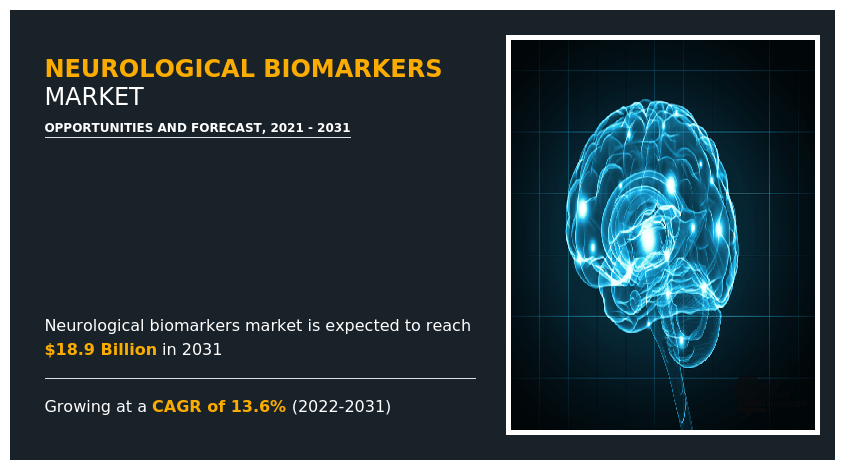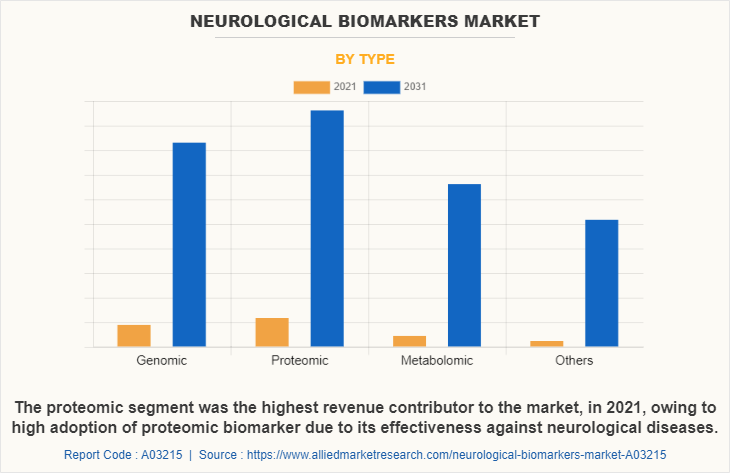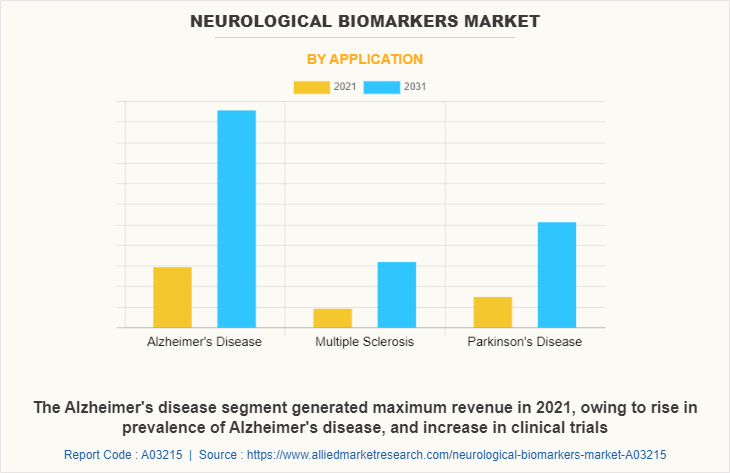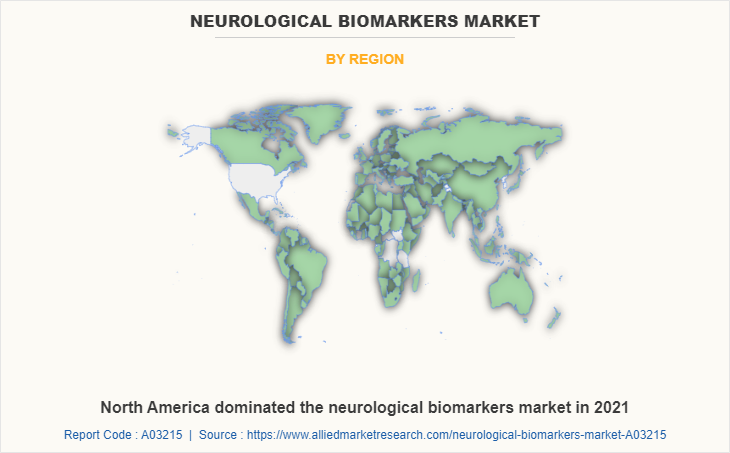Neurological Biomarkers Market Research, 2031
The global neurological biomarkers market was valued at $5.4 billion in 2021, and is projected to reach $18.9 billion by 2031, growing at a CAGR of 13.6% from 2022 to 2031. Alzheimer’s is segmented under dementia associated conditions and patients suffering from Alzheimer’s face short-term memory loss, cognitive issues, and issues regarding behavior.

In addition, Alzheimer is considered to be the most common form of dementia and is known to account for the majority of the total dementia cases across the globe.
Whereas, Parkinson’s disease is the second most common neurodegenerative disorder across the globe. Patients suffering from Parkinson’s disease face progressive deterioration of motor function that occurs over a period of time due to the loss of brain cells that produce dopamine. In-spite of being the second most common neurodegenerative disorder (after Alzheimer’s) the market for this disease is relatively small as the definite cause as well as treatment is unknown. This has further opened up new avenues for the use neurological biomarkers.
The neurological biomarkers market share has witnessed growth, owing to rise in prevalence of neurological diseases such as Alzheimer's disease, Parkinson's disease, schizophrenia, Huntington's disease, and others. For instance, according to the WHO, globally, approximately 50 million people have dementia and about 10 million new cases are reported every year.
In addition, technological advancements; launch of various products; strategies among key players such as acquisition, collaboration, and agreement drive the growth of the neurological biomarkers market.
For instance, in April 2021, Quanterix Corp., announced a webinar with leading industry experts to discuss neurological advancements related to the ultra-sensitive quantification of pTau181, pTau217, pTau231, and other neurological biomarkers.
Segment Overview
The neurological biomarkers market share is segmented on the basis of type, application, and region. On the basis of type, the market is classified into genomic, proteomic, metabolomic, and others. By application, the market is segregated into Alzheimer's disease, Parkinson's disease, and multiple sclerosis.
Region wise, the neurological biomarkers market size is analyzed across North America (the U.S., and Canada), Europe (Germany, France, the UK, and Rest of Europe), Asia-Pacific (Japan, China, India, and Rest of Asia-Pacific), and LAMEA (Brazil, Saudi Arabia, and Rest of LAMEA).
Neurological Biomarkers Market by Type
On the basis of type, the proteomic segment was the highest revenue contributor to the neurological biomarkers market analysis, in 2021, owing to high adoption of proteomic biomarker due to its effectiveness against neurological diseases. Proteomics is particularly useful in the study of pathogenesis of neurodegenerative disorders since these are caused due to misfolded proteins or protein aggregates and the study of these proteins can prove to be vital in developing new biomarkers. The proteomic biomarkers are used for improved diagnosis and stratification of schizophrenia patients. For instance, according to the Alzheimer’s Society, in 2019, over 850,000 people in the UK were suffering from dementia, which meant, in every 14 people above 65 years of age, 1 person suffered from dementia. In accordance to the current prevalence of this disorder, the expected number of people suffering from dementia is projected to rise to 1.5 million by 2040.

Neurological Biomarkers Market by Application
On the basis of application, the Alzheimer's disease (AD) segment generated maximum revenue in 2021 in neurological biomarkers market size, owing to rise in prevalence of Alzheimer's disease, and increase in clinical trials, researches and development of drug against Alzheimer's disease. Biomarkers have a key role in Alzheimer's disease (AD) drug development. Biomarkers can assist in diagnosis, demonstrate target engagement, support disease modification, and monitor for safety. The amyloid (A), tau (T), neurodegeneration (N) Research Framework emphasizes brain imaging and CSF measures relevant to disease diagnosis and staging and can be applied to drug development and clinical trials. The growth in geriatric population that is more prone to Alzheimer's disease propels the growth of the market. Additionally, few of the most significant reasons that drive the market growth of the AD segment in neurological biomarker market include rise in prevalence of AD, and increase in clinical trials, research and development of drug against AD. The growth in geriatric population that is more prone to AD propels the neurological biomarkers market growth.

Neurological Biomarkers Market by Region
On the basis of region, North America dominated the neurological biomarkers market in 2021, owing to increase in cases of cancer of different organs, robust healthcare infrastructure, presence of key players, and in rise healthcare expenditure. The growth in number of studies conducted in the U.S. indicate that the age specific risk of Alzheimer’s and other dementias in the U.S. and other high income western countries has declined in the past 25 years. Additionally, according to a study published by The Journal of the American Medical Association (JAMA) the current trend observed in the U.S. is the prevalence of Parkinson’s disease in men aged 70 years and older. However, the increment is not significant in the women population. Thus, such increase in Parkinson’s disease in men aged 70 years and over is projected to supplement the market growth owing to the increase in demand for biomarkers for diagnosis.
Thus, the increase in Alzheimer's disease, Parkinson’s disease and multiple sclerosis in North America is projected to create lucrative opportunities in the market, which further drive the market growth.

The key players operating in the neurological biomarkers market are Biomérieux, Bio-Rad Laboratories, Inc., F. Hoffmann-La Roche Ltd., Merck KGAA, Myriad Genetics, Inc., Neurobio, Perkinelmer Inc., Quanterix, Shimadzu Corporation, Thermo Fisher Scientific, Inc.
Key Benefits for Stakeholders
- The study provides an in-depth analysis of the neurological biomarkers market forecast, future estimations and neurological biomarkers market trends to elucidate the imminent investment pockets.
- It presents a quantitative analysis of the market from 2021 to 2031 to enable stakeholders to capitalize on the prevailing neurological biomarkers market opportunity.
- Extensive analysis of the market based on procedures and services assists to understand the trends in the neurological biomarkers industry.
- Key players and their strategies are thoroughly analyzed to understand the competitive outlook of the neurological biomarkers industry.
Neurological Biomarkers Market Report Highlights
| Aspects | Details |
| Market Size By 2031 | USD 18.9 billion |
| Growth Rate | CAGR of 13.6% |
| Forecast period | 2021 - 2031 |
| Report Pages | 141 |
| By Type |
|
| By Application |
|
| By Region |
|
| Key Market Players | bioMérieux, Bio-Rad Laboratories, Inc., shimadzu corporation, Thermo Fisher Scientific, Inc., F. HOFFMANN-LA ROCHE LTD., Quanterix, PERKINELMER INC., MYRIAD RBM (MYRIAD GENETICS, INC.), Neurobio, merck kgaa, darmstadt, germany |
Analyst Review
This section provides opinions of the top-level CXOs in the neurological biomarkers market across Alzheimer’s and Parkinson’s disease. In accordance to several interviews conducted, the utilization of biomarkers is projected to witness a significant increase, owing to increased demand for cost-effective and non-invasive diagnostic methods for detection of onset of the aforementioned diseases. Several market players are investing in the research activities pertaining to the development of neurological biomarkers.
According to the perspectives of CXOs, large population base aging 65 and above in the emerging economies is expected to fuel the demand for neurological biomarkers across diagnosis as well as therapy of Alzheimer’s and Parkinson’s. Moreover, surge in government funding in the development of novel diagnostic and treatment solutions in the developed countries contributes to the significant application of neurological biomarkers across the aforementioned diseases will further help the market to grow at a healthy CAGR. Additionally, the recent FDA approvals of novel neurological biomarkers and the potential of such biomarkers shown in clinical trials further assures the market capability during the forecast period.
The introduction of novel biomarkers such as blood biomarkers are a recent trend in Neurological Biomarkers Market
The Alzheimer's disease segment was the highest revenue contributor to the market and is expected to continue this trend during the forecast period.
North America dominated the neurological biomarkers market in 2021, with over 50% market share, and is expected to remain dominant throughout the forecast period.
The neurological biomarkers market generated a revenue of $5,350.2 million in 2021 and is expected to reach $18,852.1 million by 2031 registering a CAGR of 13.6% from 2022-2031.
bioMérieux, Roche and Merck KGaA are few key players holding major share in the market.
Asia Pacific region is expected to grow with a higher growth rate during the forecast period. This is due to owing to its high population base, increase in disposable income, and increase in awareness regarding neurological biomarkers among patients.
Stringent government regulations coupled with Emerging ethical issues regarding early diagnosis of Alzheimer’s disease, Parkinson’s disease, and multiple Sclerosis are 2 major factors that might restrain the market growth.
Acquisition, partnership and product launch are top three strategies adopted by key players in the market.
Loading Table Of Content...



